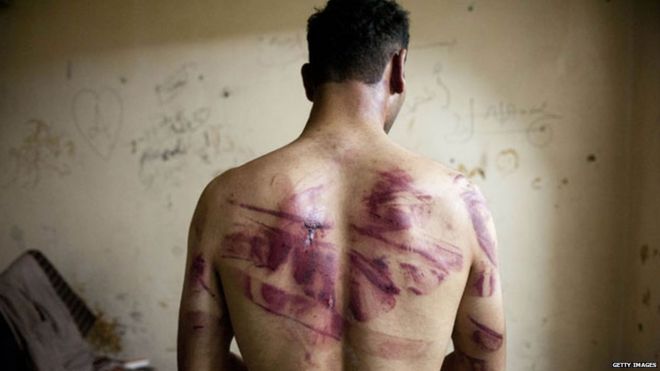Syria 'exterminating detainees' - UN report
Image copyrightGetty Images
Image captionTorture, rampant disease and extrajudicial execution claim the lives of many detainees
Displaced Syrians struggle to survive
The Syrian government has carried out a state policy of extermination against thousands of detainees, UN human rights investigators say.
They accuse President Bashar al-Assad's regime of crimes against humanity,
in a report for the UN Human Rights Council.
The study says both loyalist and anti-government forces have committed possible war crimes.
Many detainees were tortured, some were beaten to death, and others died from lack of food, water, or medical care.
The findings come from interviews with hundreds of witnesses and cover the period since the start of anti-government protests in March 2011.
The report says thousands of detainees have been killed while in the custody of warring parties during that time.
Syria torture photos 'authentic' - rights group
'How I was tortured in a Syrian jail'
Image copyrightAP
Image captionTorture and executions by so-called Islamic State are routine, the report says
Investigators suspect tens of thousands of people are detained by Syria's government at any one time.
Their report describes the situation of detainees as an "urgent and large-scale crisis of human rights protection".
Survivors' accounts "paint a terrifying picture of the magnitude of the violations taking place," it said.
The civil war in Syria has claimed an estimated 250,000 lives so far.
About 4.6 million people have fled Syria, while another 13.5 million are said to be in need of humanitarian assistance inside the country.
Extract from February 2016 report for UN Human Rights Council
Main detention facilities controlled by the General Intelligence Directorate include Interior Security branch 251 and Investigations branch 285 located in Kafr Soussa, west of central Damascus.
Former detainees described inhuman conditions of detention resulting in frequent custodial deaths.
Officers were observed giving orders to subordinates on methods of torture to be used on detainees.
Corpses were transported by other prisoners through the corridors, sometimes to be kept in the toilets, before being removed from the branch.
Evidence obtained indicates that the superiors of the facilities were regularly informed of the deaths of detainees under their control. Prisoners were transferred to military hospitals before they were buried in mass graves.
Both government and rebel sides are accused of violence against people they detain, the investigators say, but the vast majority are being held by government agencies.
A pattern of arrests since March 2011 targeted Syrian civilians thought to be loyal to the opposition, or simply insufficiently loyal to the government.
Senior government figures clearly knew about and approved of the abuse, says the report entitled Out of Sight: Out of Mind: Deaths in Detention in the Syrian Arab Republic.
Most deaths in detention were documented as occurring in locations controlled by the Syrian intelligence services.
"Government officials intentionally maintained such poor conditions of detention for prisoners as to have been life-threatening, and were aware that mass deaths of detainees would result," UN human rights investigator Sergio Pinheiro said in a statement.
"These actions, in pursuance of a state policy, amount to extermination as a crime against humanity."
Jump media player
Media player help
Out of media player. Press enter to return or tab to continue.
Media caption"Sami" recounts the horror of prison in Syria
Torture 'routine'
The report also accused opposition forces of killing captured Syrian soldiers.
Both so-called Islamic State militants and another group, al-Nusra Front, had committed crimes against humanity and war crimes.
IS, the report said, was known to illegally hold a large, unknown number of detainees for extended periods in multiple locations.
It had set up detention centres in which torture and execution are "routine".
Detainees were frequently executed after unauthorised courts issued a death sentence.
Extract from February 2016 report for UN Human Rights Council
In 2014 Syrian authorities informed a woman from Rif Damascus that her husband and two of her sons were dead, all known to have been held in a detention facility controlled by the Military Security.
The family obtained death certificates from Tishreen military hospital, stating that the cause of death of all the three victims was heart attack.
A third son remains unaccounted for.

 Are you serious? So we use American sources unless the American sources are too American in which they can't be used? The latter source was actually used to refute your source. What you've presented is circular logic, and doesn't really hold much weight.
Are you serious? So we use American sources unless the American sources are too American in which they can't be used? The latter source was actually used to refute your source. What you've presented is circular logic, and doesn't really hold much weight.


